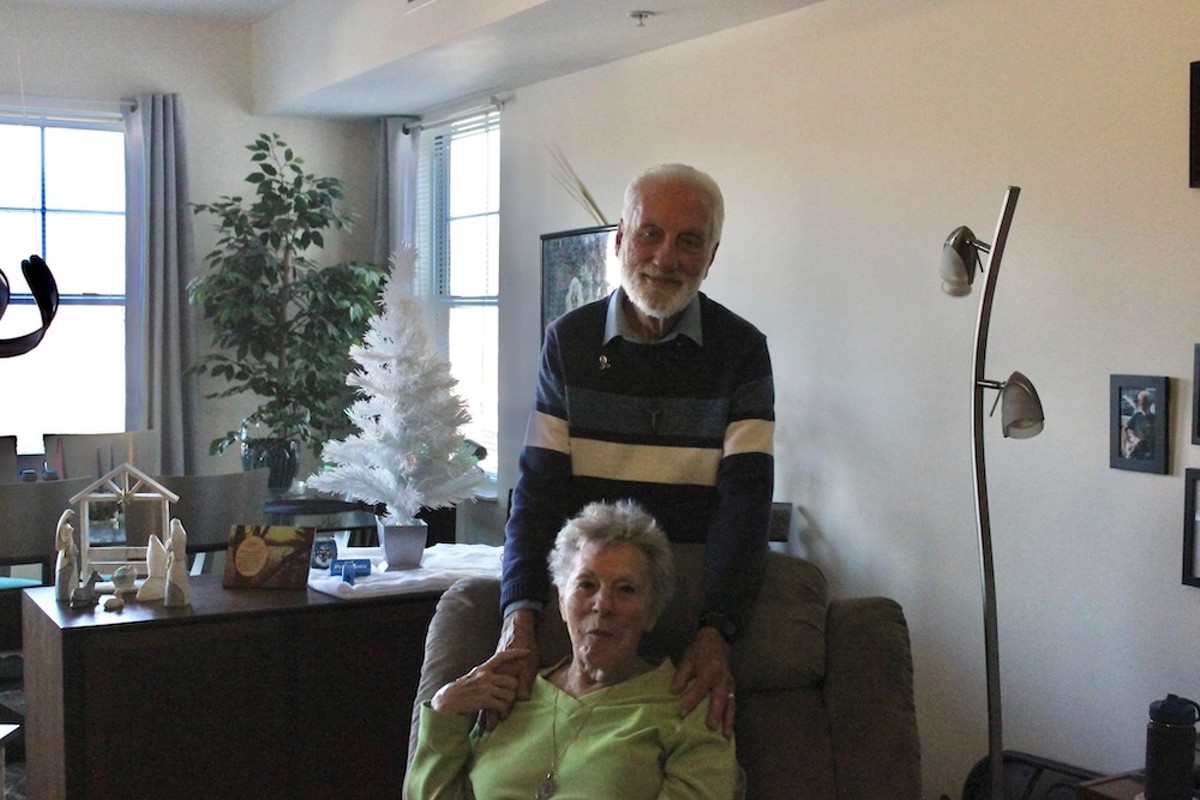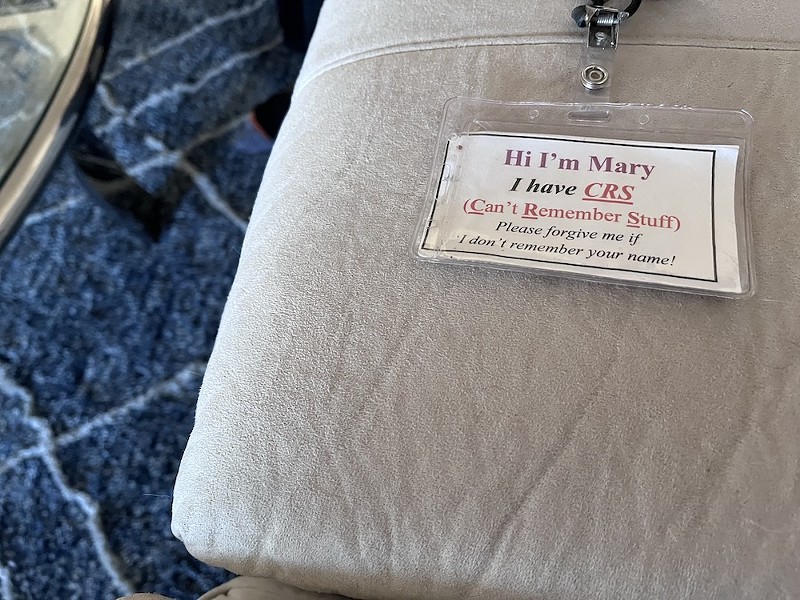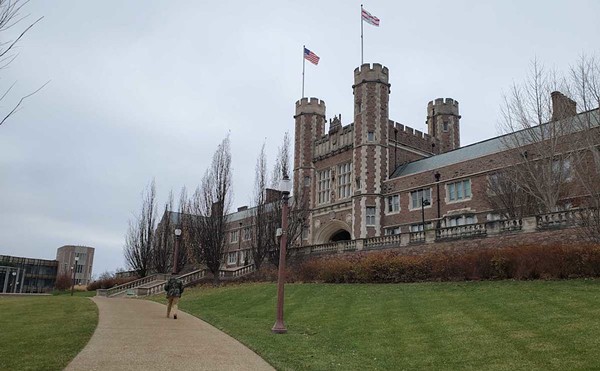Chopping down a Christmas tree was a tradition in Andy Rachelski’s family. When his wife was diagnosed with Alzheimer’s disease, some customs had to change.
“You have to make things simpler,” he says, pointing to the artificial tree behind Mary Rachelski, 83.
Andy first met his wife 62 years ago when he moved to St. Louis from Michigan to start a printing business. She interviewed to be a cashier at his store, and two years later, the couple were married. Before retiring, Mary, a St. Louis native, also worked as the activities coordinator at the Missouri Eastern Correctional Center: A state prison for men located in Pacific, Missouri. The couple has four children, eight grandchildren, and one great-grandchild.
About eight years ago, Mary began having trouble identifying family members in pictures. She received the Alzheimer’s diagnosis after an MRI showed that her brain had been shrinking, especially in the hippocampal region — an area that’s essential to memory retrieval. Her doctors said there was no cure.
“They basically said ‘good luck’ and that there wasn’t anything we could do about it,” says Andy, 81.
It’s estimated that more than 6 million Americans have Alzheimer’s disease, according to the National Institute on Aging. It’s the most common type of dementia that inhibits memory and other mental functions. Holidays can bring a special sense of loss for those dealing with the disease, including caregivers.
More than one in five Americans is a caregiver, according to the National Alliance for Caregiving: an individual who helps someone who is sick or disabled with activities of daily living.
‘Do We Keep the Traditions Alive?’
Andy Rachelski says the couple recently attended a White Elephant gift exchange at Meramec Bluffs, the assisted living community in Ballwin where they live.
“She doesn’t remember any of it,” he says.
While creating new memories becomes increasingly difficult as the disease progresses, adjusting certain environments and behaviors can ease stress for Alzheimer’s patients and caregivers.
Mary regularly wears a name tag stating that she has memory problems. Rachelski family members also wear name tags at holiday gatherings.
“I’m preparing a bunch of them that say the name of the person and what their relationship to Mary is,” says Andy. “This helps explain what’s going on so people don’t get insulted if she doesn’t remember them.”
People with Alzheimer’s are also more likely to become distressed and agitated with the increasing loss of sunlight during the fall and winter months, according to the Alzheimer’s Association.
Andy Rachelski uses whiteboards to help his wife with each week’s activities, like visits with a cognitive stimulation therapist and trips to Serenity Adult Day Center in Fenton. He also sets timers to help her remember when to eat, take vitamins, and to sleep.
Strategies like these, as well as modifying traditions, are especially important, says Jeremy Koerber, the community programs director of the Alzheimer’s Association Greater Missouri Chapter. He recommends talking to family and friends before events, as decorations and lots of people may cause overstimulation and fatigue.
“Do we keep the traditions alive? It’s important to have these conversations,” Koerber says.
Koerber also recommends breaking up the holidays into smaller segments, like only staying for part of a party and finding quiet places to rest after interacting with lots of people.
“What works for one person may not necessarily work for another,” says Koerber. “But what we do know is that if you can apply these techniques, you can start to make things easier.”
Caregiving Is ‘Taking Care of Me’
Andy Rachelski spends a lot of his day preparing food for his wife and organizing her schedule.
“But really, a big part of caregiving is just taking care of me,” he says.
In the morning, he exercises and runs errands while his wife is still asleep. He also attends several different Alzheimer’s caregiving groups throughout the month. These groups include people who’ve lost their spouses to Alzheimer’s or who are currently caregiving for a relative with it.
“No one experiences the disease the same way, but the biggest advantage caregivers have is talking to other caregivers,” he says.
The couple have long-term care insurance, a plan that helps cover the costs of a nursing home, an assisted living facility, home health care and other services. However, many insurance plans can be very expensive or have high premiums, and pre-existing conditions may disqualify you. In addition, products that are necessary for many Alzheimer’s patients, like incontinence supplies, are not always covered.
According to AARP, nearly 48 million Americans care for a family member without pay. In most cases, Medicare doesn’t cover the cost of custodial care, such as help with bathing, dressing, eating or using the bathroom, and Medicaid only pays for care if income and assets fall below certain levels.
“Even if you’re a really good saver, it doesn’t take a lot of these expenses to eat up all your money,” he says.
That’s part of the reason why Andy Rachelski believes humor and continued optimism are an essential part of caregiving. It’s even more true while dealing with the daily frustrations of the disease, like when his wife asks questions repeatedly.
“I just say ‘I forgot to tell you,’ because if she gets upset that’s not good. I’ve got to meet her right where she is,” he says.
The couple continues to attend holiday gatherings with family and friends even when Mary Rachelski doesn’t remember them. Since her diagnosis, living in the present as much as possible and focusing on the most meaningful things in life, like family and friends, have become even more important.
“The disease is maddening, but there’s a lot of living left to do,” he says.
Subscribe to Riverfront Times newsletters.Follow us: Apple News | Google News | NewsBreak | Reddit | Instagram | Facebook | Twitter | Or sign up for our RSS Feed







